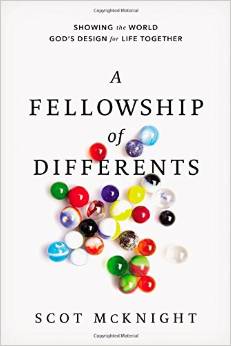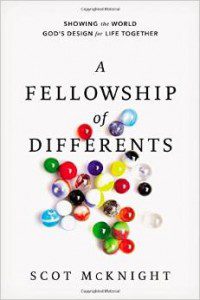 From A Fellowship of Differents.
From A Fellowship of Differents.
Every fall the church I grew up in had a revival, a weeklong set of evening services designed to get our neighbors saved. In order to do so, we first had to invite them to church, which took more pluck than I usually had. When they got to our church service, they encountered an enthusiastic church, sacred music ramped up to its best, and a revivalist or evangelist who could tell stories that would make your hair frizz and scare the be-jeezus out of you. To give folks plenty of time to respond to the evangelist’s invitation, we often sang the famous Billy Graham song Just As I Am. At least once, we sang through all six verses twice.
I had a friend who sometimes went forward as soon as the music started because, knowing how long the invitation could last, he thought he’d be released from the service faster if he just went forward, cooperated with the counselor who led him through the Sinner’s Prayer (“Lord Jesus, I am a sinner, I invite you into my heart . . .” and so on), and then left through the back door. More than once, I held out only to find him already outside and laughing up a storm about how long it had taken the rest of us.
Sadly, those emotion-packed revival sermons have made me uncomfortable with the words salvation and saved, and I’ve spent much of my professional life trying to regain a love for them. The first thing that helped me appreciate the terms was learning — and I can’t remember from whom — that salvation has three tenses in the New Testament. Biblical salvation is salvation times three.
Past: We have been saved (Romans 8:24).
Present: We are being saved (Philippians 2:12).
Future: We will be saved (Romans 13:11).
Add these together and you come up with something vitally important for life in a fellowship of differents: salvation is a process, not a one-time, one-and-done event. It takes, one might say, a lifetime and beyond to get saved, but there is an idea behind all uses of the term salvation that turns it into a story, the story of the Exodus and Promised Land….
Jesus Christ is our own Passover sacrifice (1 Corinthians 5:7), which means that we who are in Christ have experienced an exodus from the Egypt of three things.
First, we are saved from systemic oppression. Paul revises this exodus-from-Egypt theme into being rescued from cosmic principalities and powers. After close to two decades of traveling the Roman Empire, preaching the gospel and feeling the forces of evil in systemic opposition from high places and seeing that displayed in sexualities beyond descrip- tion, Paul says this:
For our struggle is not against flesh and blood, but against the rulers, against the authorities, against the powers of this dark world and against the spiritual forces of evil in the heavenly realms. (Ephesians 6:12)
What does this look like for life in the church? We are to drive out, by the power of the Spirit, the Egypt of oppression, ethnic divisions, gen- der hierarchies, and the creation of other such boundaries, to name but a few. Then, from among us, we are to establish in the church a commu- nity painted with the colors of peace, love, justice, reconciliation, holiness, righteousness, and wisdom. For Paul, Egypt was the ways of the Romans, and the Promised Land, in part, is new life in the church.
Second, we are saved from “Egypt’s” cosmic, Satan-driven assault of death against us. As Pharaoh wanted to put the children of Israel to death, so Satan’s design is death from the moment we are born until the moment we die. In Christ, however, we are liberated from the Egypt of death. Paul sums this up when he writes to Timothy:
He has saved us and called us to a holy life — not because of anything we have done but because of his own purpose and grace. This grace was given us in Christ Jesus . . . who has destroyed death and has brought life and immortality to light through the gospel. (2 Timothy 1:9 – 10)
The Bible’s major enemy — from Genesis 3 on — is death. At the heart of our Egypt is death, and our Passover lamb, the one who died in our place and for our forgiveness, has liberated us from that death.
Finally, we are saved from a life of sin. Here is how Paul talks about our past life of sin (Titus 3:3–7), and I’ve italicized “Egypt” words and emboldened “exodus” words and, to anticipate the next section, under- lined “Promised Land” words:
At one time we too were foolish, disobedient, deceived and enslaved by all kinds of passions and pleasures. We lived in malice and envy, being hated and hating one another. But when the kindness and love of God our Savior appeared, he saved us, not because of righteous things we had done, but because of his mercy. He saved us through the washing of rebirth and renewal by the Holy Spirit, whom he poured out on us generously through Jesus Christ our Savior, so that, having been justified by his grace, we might become heirs having the hope of eternal life.
As Israel left Egypt, so we’ve left the Egypt of sin and systemic injustices by the power of our mighty deliverer, and we are headed for the Promised Land. God is on our side. Ringing in my ears is God’s promise to the children of Israel: “The Lord will go before you, the God of Israel will be your rear guard” (Isaiah 52:12). God’s mission was to rescue and to escort Israel safely home to the Promised Land.









